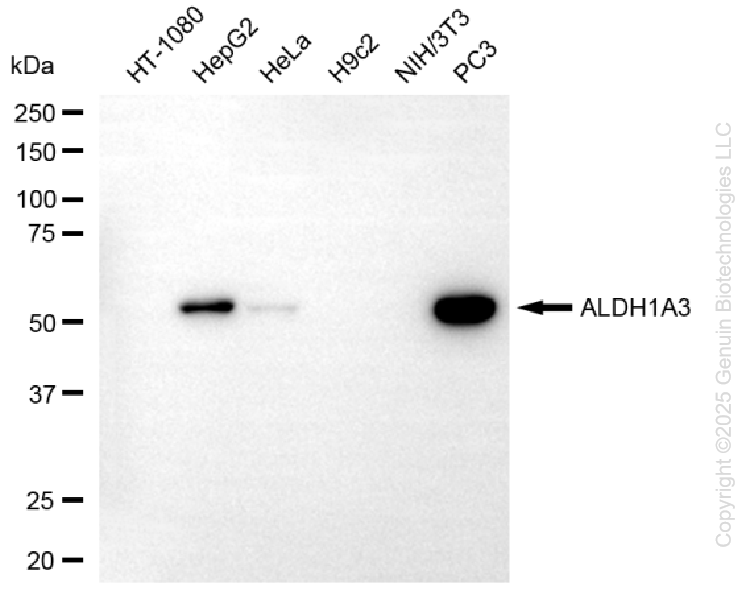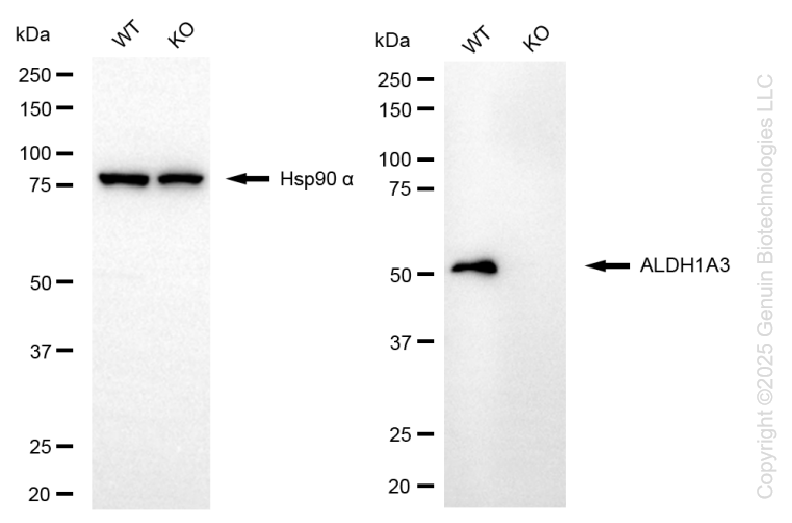KO-Validated Anti-ALDH1A3 Mouse Monoclonal Antibody
Mouse monoclonal antibody
- SPECIFICATION
- CITATIONS
- PROTOCOLS
- BACKGROUND

Application
| WB |
|---|---|
| Primary Accession | P47895 |
| Reactivity | Human |
| Clonality | Monoclonal |
| Isotype | Mouse IgG1 |
| Clone Names | 25GB3805 |
| Calculated MW | Predicted, 56 kDa; observed, 56 kDa |
| Gene Name | ALDH1A3 |
| Aliases | ALDH1A3; Aldehyde Dehydrogenase 1 Family Member A3; Retinaldehyde Dehydrogenase 3; RALDH3; ALDH6; Aldehyde Dehydrogenase 6; Aldehyde Dehydrogenase 1 Family, Member A3; Aldehyde Dehydrogenase Family 1 Member A3; Acetaldehyde Dehydrogenase 6; EC 1.2.1.36; EC 1.2.1; ALDH1A6; RALDH-3; RalDH3; MCOP8 |
| Immunogen | Recombinant protein of human ALDH1A3 |
| Gene ID | 220 |
|---|---|
| Other Names | Retinaldehyde dehydrogenase 3, RALDH-3, RalDH3, 1.2.1.36, Aldehyde dehydrogenase 6, Aldehyde dehydrogenase family 1 member A3, ALDH1A3, ALDH1A3, ALDH6 {ECO:0000303|PubMed:7698756} |
| Name | ALDH1A3 |
|---|---|
| Synonyms | ALDH6 {ECO:0000303|PubMed:7698756} |
| Function | Catalyzes the NAD-dependent oxidation of aldehyde substrates, such as all-trans-retinal and all-trans-13,14-dihydroretinal, to their corresponding carboxylic acids, all-trans-retinoate and all-trans- 13,14-dihydroretinoate, respectively (By similarity) (PubMed:27759097). High specificity for all-trans-retinal as substrate, can also accept acetaldehyde as substrate in vitro but with lower affinity (PubMed:27759097). Required for the biosynthesis of normal levels of retinoate in the embryonic ocular and nasal regions; a critical lipid in the embryonic development of the eye and the nasal region (By similarity). |
| Cellular Location | Cytoplasm {ECO:0000250|UniProtKB:Q9JHW9}. |
| Tissue Location | Expressed at low levels in many tissues and at higher levels in salivary gland, stomach, and kidney |

Thousands of laboratories across the world have published research that depended on the performance of antibodies from Abcepta to advance their research. Check out links to articles that cite our products in major peer-reviewed journals, organized by research category.
info@abcepta.com, and receive a free "I Love Antibodies" mug.
Provided below are standard protocols that you may find useful for product applications.
If you have used an Abcepta product and would like to share how it has performed, please click on the "Submit Review" button and provide the requested information. Our staff will examine and post your review and contact you if needed.
If you have any additional inquiries please email technical services at tech@abcepta.com.














 Foundational characteristics of cancer include proliferation, angiogenesis, migration, evasion of apoptosis, and cellular immortality. Find key markers for these cellular processes and antibodies to detect them.
Foundational characteristics of cancer include proliferation, angiogenesis, migration, evasion of apoptosis, and cellular immortality. Find key markers for these cellular processes and antibodies to detect them. The SUMOplot™ Analysis Program predicts and scores sumoylation sites in your protein. SUMOylation is a post-translational modification involved in various cellular processes, such as nuclear-cytosolic transport, transcriptional regulation, apoptosis, protein stability, response to stress, and progression through the cell cycle.
The SUMOplot™ Analysis Program predicts and scores sumoylation sites in your protein. SUMOylation is a post-translational modification involved in various cellular processes, such as nuclear-cytosolic transport, transcriptional regulation, apoptosis, protein stability, response to stress, and progression through the cell cycle. The Autophagy Receptor Motif Plotter predicts and scores autophagy receptor binding sites in your protein. Identifying proteins connected to this pathway is critical to understanding the role of autophagy in physiological as well as pathological processes such as development, differentiation, neurodegenerative diseases, stress, infection, and cancer.
The Autophagy Receptor Motif Plotter predicts and scores autophagy receptor binding sites in your protein. Identifying proteins connected to this pathway is critical to understanding the role of autophagy in physiological as well as pathological processes such as development, differentiation, neurodegenerative diseases, stress, infection, and cancer.



